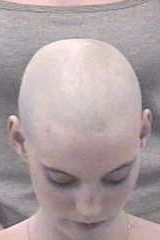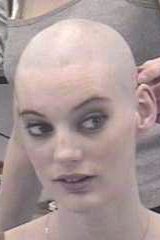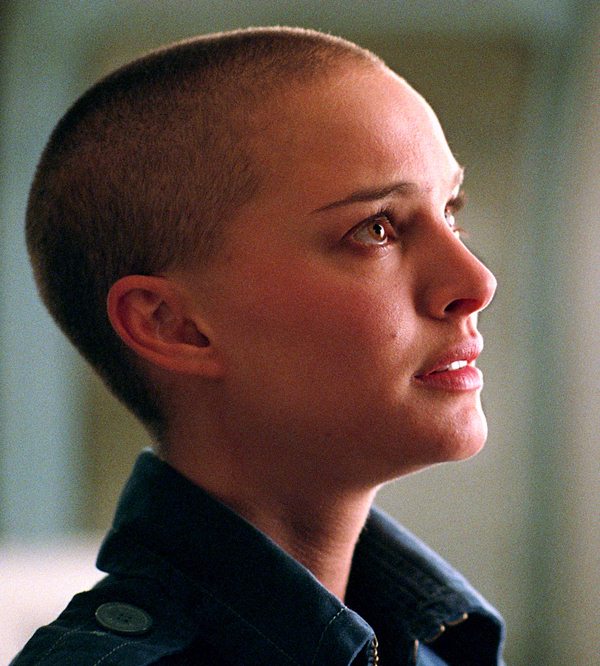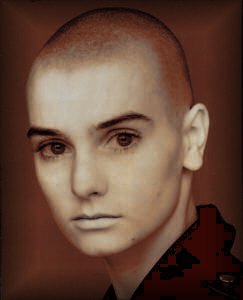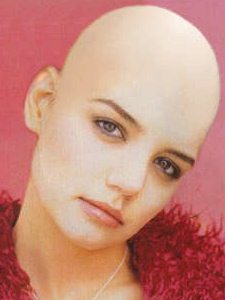 |
||||||||||
|
Women's Hair: Shaving Your Head & Other Fun Things
What I Learned By Shaving My HeadBy Kaitlin Duck Sherwood In August 1991, I shaved my head. Why On Earth Did You Do THAT? My decision to shave actually was the confluence of a number of forces.
RESULTS This is Tough! Shaving a round object with a flat object is actually quite tricky, especially when the view of the round object is partially obscured by the rest of the round object. I ended up buying a pair of clippers and trimming down to about 1/8" every six weeks or so. A More Personal Interest In Gay Rights For the first few weeks after I shaved my head, I walked around very nervously, convinced that people were going to jump out of alleys and beat me up for being a lesbian. Because I am straight and have a lot of straight friends who I am certain are totally disinterested in hurting my large number of gay friends, I knew that not all straight people hate all gay people. That didn't matter. I was still nervous.
After several weeks of not getting beaten up, I relaxed. But the experience made me personalize the fight for gay rights. Instead of being for gay rights because it was "the ethical thing to do", I now have a personal motivation because I realized there is nothing I can do to prove that I am NOT gay. My friend Wendy had a (straight) friend whose brother (that Friend hadn't seen in many years) came to visit him in Oregon. Friend gave his brother a hug on the front porch when he showed up. Friend got kicked out of his apartment complex for being gay. "He's my brother!" "Doesn't matter. You're gay, you're out of here." At that time, there were no laws there against discriminating against gay people, and there was nothing he could do to prove to his landlady that he wasn't gay. He had to move.
Being Happier There is a very intriguing book by Shelby Steele called The Content Of Our Character. It is written primarily for the African-American community, and discusses two strategies for not getting hurt by whites. Remember, lynchings of blacks by whites used to be quite the sport. One is the "shucking and jiving" role: Don't hurt me because I'm no threat to you. The other is the the "menacing role": Don't hurt me or I will hurt you. Because I had read this book, I was able to recognize quickly that people got nervous around me if I was neutral. I was scary. I also knew the antidote: smiling a lot. (This also worked to dispel concerns that I might be undergoing chemotherapy or have some other nasty disease. The image people have of deathly ill people is not of a smiling face.) And by golly, do you know what happens if you smile? You feel better! You mingle better at parties. People come talk to you. People smile back at you! :-) Envious Looks I was certain that nobody was going to ever talk to me again, that I'd get funny looks in the grocery stores, and that I wouldn't get a date for seventeen years. People responded in exactly the opposite manner! Men who had never given me the time of day before crossed rooms to talk to me. I got looks in the grocery stores, but they were "OOoooooh, I wish I had the nerve to do that!" looks. I think what happened was that people said to themselves, "She has a shaved head. She must be interesting." Never mind that I hadn't changed anything else; it's just that my native irreverence was more obvious. This caused me to start:
Being More Interesting Once everyone started treating me as being interesting and unusual, I sort of felt like I had a responsibility to be more interesting. In particular, it was very difficult for me to not buy a motorcycle during this period! In general, I started being more daring, trying more things, and being more "artsy". (It was in this period that I got involved with High Tech Heroes, for example.) No More Itching Scalp I started using Ivory soap on my head, and my scalp was much happier. Even now, when I have hair again, I still use plain old Ivory bar soap, and it seems to work just fine. :-)
Hats! Most people don't wear hats. Hats mess up your hair. No hair to mess up, no problem! Furthermore, if you have no insulation on your scalp, it gets cold, and you WANT a hat. I went wild with berets. I have red berets, pink berets, blue berets, green berets, brown berets, teal berets, purple berets... I have about twenty berets all told. I wore them with business suits, with jeans, with ski pants, with skirts - it was all quite fun.
Californians Don't Care I thought that I might have to grow my hair back or scare off my clients. Nah. They just didn't care. I suppose that if I were no good at what I did ( timing analysis consulting), then it might have been a problem, but nobody really cared - not even in Chippewa Falls, WI. I also noticed that Californians have great license in the rest of the country. I went to a wedding in Chicago, and a friend reported that she heard some women talking about my haircut briefly. "Oh, she's from California", and that made it ok.
Traveling Is Great Not having to deal with brushes and combs and hairdryers and so on makes traveling very easy. And if you don't have hair, you can wash yourself in a sink much more easily. On my New Zealand trip, my traveling companion got her hair buzzed when she saw how convenient it was. Also, I had heard that Italian men grope. Couldn't prove it by me! I didn't get pinched once during my Europen trip.
Oooooh, YUK! Something that I had known was that in France and Italy, the women who collaborated with the Nazis were held down and shorn. I was careful to keep my beret on most of the time during the trip, as I didn't want to offend anybody. (Shock is ok, offend is not.) I was braced for people being cold to me because of thinking I might be a skinhead, but with adequate smiling, that turned out to not be a problem. However, one night in Florence I popped down from the hostel to make a phone call and left my beret in the room. I had probably 1/4" of hair - enough to show color but short enough to be conspicuous. I bumped into a tall guy with a shaved head. He said to me (in Italian with a sly grin), "I like it that your hair is blonde." I had braced myself for people disliking me for possibly being a Nazi; I had not prepared myself for the possibility that someone might like me for possibly being a Nazi! I didn't know if I should belt him or throw up. I decided in a hurry that I was Finnish and didn't understand a word of Italian, went back to my room, and shuddered for twenty minutes.
People Notice You I am occasional guest host on High Tech Heroes. Before I went on camera the first time, the producer and I thought long and hard about whether I should grow my hair out or keep it short. Finally, the producer decided he wanted me to keep it short: "Somebody might be channel-surfing and stop to see who this bald woman is." Months later, I heard that a woman had been channel surfing, and stopped to figure out who this bald woman was. She watched for about five minutes before she realized that it was High Tech Heroes, the show that her boyfriend directs! So Why Did You Grow It Back? I moved from California to Illinois in Jan 1993 to start graduate school. It is COLD in Illinois in the winter!

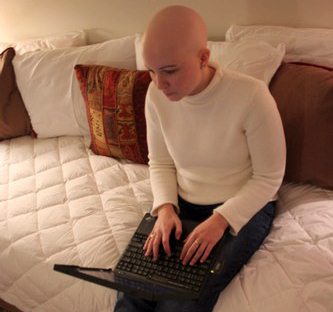
|
|
|||||||||
|
|
||||||||||
Hairy WomenBy Lindsay How often is it that the most admirable woman represented in a documentary is a glamour model, especially when she is in the company of "average" women? On this programme, where I am to assume that the women they chose were meant to represent a cross-section of attitudes toward female body hair, the model was the only one who came across as having a realistic attitude toward the subject. As someone tuned into the diversity of experience within any societal group, I could easily criticise Hairy Women for not even touching on the differing views of women of colour, working class women, lesbians, etc. while claiming to present the universal views of 'women', but it is usually not worth judging television by these standards. Nor need I point out that, besides the model who shaved as a requirement of her job, these women's choices of hair removal, salon waxing and laser treatment, require loads of money and time from the consumer that would make them inaccessible to many. Fortunately, there are a number of other reasons to be infuriated by this programme, especially when you are someone who isn't hair-free by choice. I was actually surprised at how far the experiences of these women were from my own, not only because I am hairy but because I am friends with other women who have made the same choice and support each other. On the programme, Peta normally waxes every two weeks and suffers ingrown hairs as a result but agreed to grow out all her body hair for eight weeks. While the netball team made up of her "friends" were more than willing to be candid about their own nipple hair anxiety in front of the camera, they were also hell bent on publicly voicing their disgust at Peta's half-inch leg hair. Another woman featured was filmed anonymously because she hadn't even told her friends and family about her excess chin hair. After cringing at Peta's public shaming you couldn't really blame her for fearing other people's reactions. But Peta was no victim and managed to perpetuate some myths of her own, especially the one that you sweat more and have worse body odour when you don't shave your underarms. In fact, skin-to-skin contact causes more sweating and a layer of hair actually prevents that from happening by allowing air to get there more easily. It was just a way to portray hairy women as dirty, smelly and generally unattractive, descriptions Peta goes to great lengths to distance herself from. Another character was the PR exec who spends an hour every morning plucking stray hairs, bleaching her arms and generally freaking out about every hair on her body. At the salon, she chose the Hollywood bikini wax, every single pubic hair removed. Her friend tries to reason with her that "we all have a little bum fluff" to which she responds, "well I don't want that" without a shred of irony. Eventually she opts for laser hair removal, priced about £250 a pop. Can you imagine the day when a beautician at a hair removal clinic tells a potential customer, "there isn't even any hair there"? It's not only women presented as simple, one-dimensional stereotypes completely consumed with the white beauty ideal; this documentary unfairly represented men as having completely homogeneous views towards women's body hair. I guess nobody here had ever heard of punk rock, hippies or even fetishes. The men interviewed don't speak about themselves as individuals but willingly speak for everyone with a Y chromosome, something that is in no way discouraged by the filmmakers. The only man who has accepted his partner's hair is the fiancé of the anonymous woman and this appears to be nothing more than support for someone with a serious anxiety. All we hear about PR exec's husband is that he likes the Hollywood because well, it's good for oral sex. I imagine that some of that acceptance and enjoyment might stem from the prepubescent look of a bald vagina. Peta's boyfriend, who happens to leave her halfway through her experiment, is presented as just a normal bloke. At one point after they have broken up, Peta looks at her underarm hair and proclaims, "I don't feel liberated". This comes only a few weeks after she expresses worries about the experiment because her boyfriend prefers her "slim, toned and hairless". This is never challenged by pointing out that liberation in fact comes from the mind first, with body hair possibly following after. With the numerous levels on which you can hate this programme, one stands out above all the rest for me. The limited range of women chosen to represent attitudes to body hair ends up completely serving the prevailing attitude that says women are not ladylike unless it is eliminated. Although I'm no psychologist, I would unquestioningly classify Mrs. PR's behaviour as an indication of obsessive-compulsive disorder. When worries of one hair on your leg completely dictate your day and your concentration, it is nearly impossible to lead anything resembling a healthy or fulfilling life. It seems like the filmmakers might be trying to point out just how needless these obsessions with body hair are by occasionally telling the participants that it is natural or by purposely finding women who dwell so much on this particular aspect of their appearance. Unfortunately, in the limited context, what would be considered extreme anxiety looks normal and if anything, just the slightest bit excessive. It's like trying to make a statement about abnormal body image by using an anorexic, a bulimic and someone who is naturally extremely thin and being surprised when it ends up stating absolutely nothing new or worthwhile. This is especially true in Hairy Women when every single participant ends her journey happy to be hairless, making it a real stretch to find a deeper subtext questioning society's or even these particular women's values.
Bald women struggle to be coveredBy Mara Altman Sarah Carroll’s hair once fell to her lower back. It was dark brown, curly and thick. Like many 16-year-olds, she would toss it over her shoulder, put it in braids during a hot summer day or wear it up in a hat while playing soccer. But then suddenly bald spots started appearing. Within a month all her hair, except an area the size of a silver dollar, had fallen out. “I would wake up in the morning and my pillow would be full of hair,” Sarah said. “I would hold it and wonder why I couldn’t put it back in.” She was diagnosed with alopecia areata, an autoimmune disease in which the affected hair follicles are mistakenly attacked by the person’s own immune system, causing hair growth to stop. The disease, which affects 1 in 60 Americans, is expressed differently in each person; some lose all their hair, others lose only small patches. Alopecia sufferers find themselves in a predicament because the only physical symptom of the disease is hair loss; there is no pain. While they depend on hair prostheses to cure their emotional suffering, many insurance companies refuse to reimburse them for the hairpieces, calling them merely cosmetic. Mike Barry, the director for public affairs at the New York State Insurance Department, says that most insurers will not pay for a wig because they do not see it as a medical necessity. “It is a judgment call for each insurer,” he said. “But anecdotally wigs would be considered a cosmetic expense in most quarters.” This has outraged those who see wigs as an essential part in overcoming the disease and living a normal life. “Hair is important for people,” said Lisa Gallagher, a program director for the National Alopecia Areata Foundation. “It is like losing a limb, and you have to go through all the psychological components of that.” Sarah has a rare form of alopecia that causes complete body hair loss. She was happy about not having to shave her legs anymore, but it hardly made up for her emotional suffering. It was only when she got fitted for a suction wig—-a hair prosthetic custom designed to fit her head—-that life became bearable again. The wig, which will not move a millimeter whether she snorkels, skydives or bungee jumps, gave her the boost in self-confidence she needed to feel comfortable in public. With her wig securely fastened to her scalp for the first time, she looked into the mirror and said, “I’m not a freak anymore!” Because she grew up in New Hampshire, one of four states that mandate wig reimbursement for alopecia sufferers (the others are Wisconsin, Minnesota and Missouri), she was able to get the hair prosthesis, which can cost more than $3,000, covered by her insurance. Now, at 27, putting on her wig is as routine as slipping on a pair of shoes.
People who live in the 46 other states must go through a rigorous procedure just to get insurance companies to consider offering coverage. “Insurance companies will cover a breast prosthesis after a mastectomy,” said Debbi Fuller, a beautician and alopecia sufferer who lives in New Hampshire. “It is the same thing. A wig helps someone to act and be seen normally in society,” Sarah, who would once cringe at the sight of a Pantene shampoo commercial, is now comfortable with her baldness, but she continues to wear a wig because she finds co-workers and others are not so accepting of her condition. She says that most people automatically assume that a bald woman is undergoing chemotherapy. “I just don’t like the pity look,” she said of people who stare at her when she goes wigless on the street. Some women, after decades of baldness, refuse to leave their homes. One young woman clipped hair-product advertisements from magazines and made a towering scrapbook. Another had tried so many treatments that she had to fly around the world to find a new one. Gallagher insists that wigs are needed for alopecia sufferers’ mental well-being. “Not having hair on your head suddenly is psychologically debilitating,” she said. “Hair is more than something that just goes on top of your head; it is part of your identity.” When Sarah lost her hair, she had to learn to appreciate the sight of her bare cranium and accept it to become whole again. “I would look in the mirror and not know me,” she said. If it were not for her wig, she says she never would have played sports or dated a guy again. She has become so comfortable now that when she gets home from her job as a computer consultant, the first thing she does is peel off her wig as if the luminous orb beneath held a secret super power. She wipes the oils from her head while her boyfriend stands by to rub his fingers over her scalp to relax her. The battle continues in almost every state to implement legislation that would require insurance companies to pay for hair prostheses. Meanwhile, alopecia sufferers will look in the mirror each morning and struggle to accept their hairless reflection and wish that society did too. Sarah has lived with it long enough now to see the bright side. “It takes me 20 minutes to get ready,” she said, popping on her silky brown wig, already styled. “And in a way, I’m lucky. My sister’s going gray at 30.”
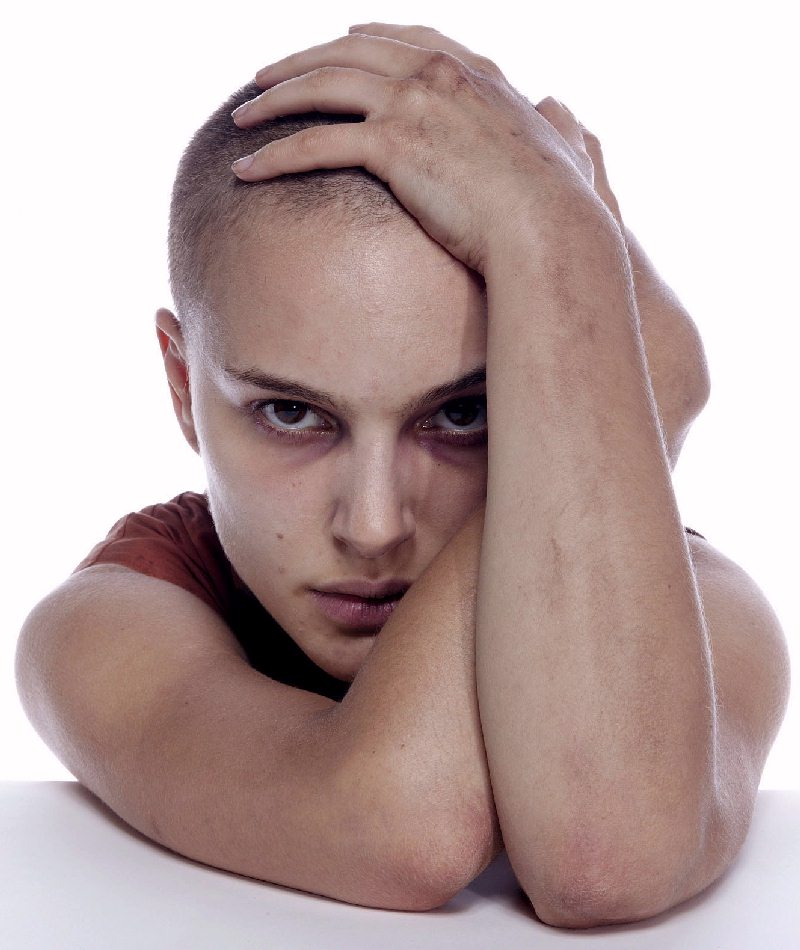
The Bald Natalie Portman: Trend Setter?Although very doubtful, let’s contemplate a world in which a few other stars went down the bald path.
|
||||||||||
 |
|
 |
||||||||







